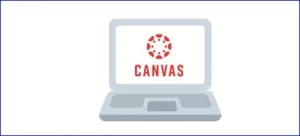How Canva Detects Cheating: How foolproof it is

Canvas is a Learning Management System (LMS) used by many educational institutions to deliver and manage online courses. As a popular LMS, Canvas is used by many schools and institutions to deliver courses and facilitate online learning.
Since students tend to try to cheat in online exams, Canvas was designed to prevent academic dishonesty. The platform offers a variety of tools and features that can help instructors detect and prevent cheating. We discuss them below;
How Canvas Detects Cheating
Canvas detects cheating by using plagiarism scans, proctored testing and identity confirmations. While Canvas has features to help prevent cheating, such as Turnitin, Lockdown browsers, and technology to monitor student activity during exams, it ultimately relies on instructors and proctors to identify and address instances of cheating.
1. Turnitin integration

Canvas integrates with the plagiarism detection software Turnitin, which allows instructors to check students’ written assignments for instances of plagiarism.
This helps instructors ensure that students are submitting original work and not copying from other sources.
This software can scan written assignments and compare them against a vast database of online content to identify instances of copying and pasting.
2. Proctored Exams
Canvas offers the option of setting up proctored exams, which are monitored by a third-party proctoring service. During these exams, students’ computer cameras and microphones are used to monitor their behavior and ensure that they are following the rules.
This helps to prevent students from cheating during exams by looking up answers or communicating with others.
3. Randomized Questions
Canvas also allows instructors to create exams with randomized questions, making it more difficult for students to share answers or cheat.
Each student will receive a different version of the exam, with a different set of questions, which helps to maintain the integrity of the exam process.
In some cases, online exams can be set up to provide students with different versions of the same exam, each with a different set of questions, to make it more difficult for students to cheat by sharing answers.
4. Automated Cheating Detection
Canvas has a built-in cheating detection algorithm that analyzes patterns of student behavior during online exams and provides instructors with a report indicating any suspicious activity.
For example, the algorithm can detect when multiple students are taking the exam from the same location, or when a student’s typing speed suddenly increases. This can help instructors identify potential instances of cheating and follow up as needed.
5. Digital fingerprinting
This technique creates a unique identifier for each student’s device and tracks any suspicious activity, such as multiple devices being used from the same location or a sudden change in typing patterns.
Is Canva Foolproof?
It’s important to note that these tools and features are not foolproof and there is always a possibility that students may find ways to cheat. Nevertheless, they can be useful in reducing the occurrence of cheating and promoting academic integrity.

The responsibility of maintaining a fair and honest learning environment, however, also falls on the students themselves, who should be held to high standards of ethics and behavior in their online coursework.
In addition to these tools and features, Canvas also offers other features that can help create a fair and honest learning environment, such as secure testing environments, time limits for exams, and the ability to lock students into the exam interface so that they cannot access other resources during the exam.
However, it’s important to remember that no single tool or feature can guarantee 100% prevention of cheating. It’s up to both the instructors and the students to maintain academic integrity and follow the rules and guidelines of the course.
Do all Online Learning Platforms detect Cheating
It depends on the specific platform and tools being used. Some online learning platforms have built-in measures to detect cheating, such as using plagiarism detection software to check written assignments, or using proctoring tools that monitor students during online exams.
However, these tools are not fool-proof and there is always a possibility of students finding ways to cheat. Ultimately, the responsibility of maintaining academic integrity falls on both the students and the instructors, and it is important for everyone to follow the rules and regulations of the course.
It’s important to note that no single tool can guarantee 100% detection of cheating. Some students may still find ways to cheat even with these measures in place.
That’s why it is also important for instructors to be vigilant and to follow up on any suspicious behavior they observe.
Ultimately, the goal of these tools is not just to catch cheaters, but also to create an environment that promotes academic integrity and encourages students to engage with the course material in a honest and meaningful way.
How does Canvas prevent Cheating
Online learning platforms can use a variety of tools to prevent cheating. Some of the most common methods include:
1. Plagiarism detection software

This software can scan written assignments and compare them against a vast database of online content to identify instances of copying and pasting.
2. Proctoring tools
During online exams, proctoring tools can monitor students’ behavior and activity, such as capturing their screen, audio, and video, to ensure that they are following the rules and not cheating.
Such proctor tools lock a computer and are able to detect student activities. Through them, Canvas can detect open tabs and prevent their use by a student when the test is in progress.
How to know if iLearn is good
I can tell you that the relative benefits of different online learning platforms can vary depending on a number of factors, such as the specific courses offered, the quality of the instructors, the level of student interaction and support, the available technology and tools, and the overall user experience.
If your school iLearn, it may be helpful to do your own research and compare it against other similar platforms based on your individual needs and preferences.
This is because iLearn uses in a specific online learning platform. Your research could include reading reviews and testimonials from past and current students, as well as looking at the platform’s features, pricing, and support options. By carefully considering these factors, you can make an informed decision about which platform is the best fit for you.

